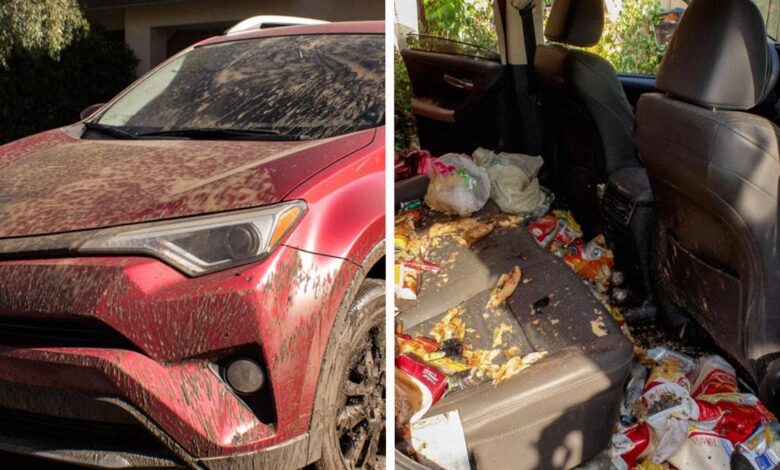
My name is Rachel, I’m 32 years old, and for most of my life, I’ve been the dependable one in my family—the one who works hard, saves carefully, and keeps everything together when others can’t. That role shaped me into the responsible adult I am, but it also made me cautious. I rarely spoiled myself, and when I did, it was only after years of saving and sacrifice. So when I finally bought a brand-new car earlier this year, it felt like a milestone, a personal victory I had earned after a decade of grinding away. I named her Rosie, a cherry-red symbol of everything I had achieved on my own. Rosie wasn’t just transportation—she was the first real indulgence I had ever given myself.
Of course, in my family, responsibility has always had a shadow. That shadow is my younger sister, Melissa. She’s 28, a free spirit by her own definition, but in truth, she’s careless and entitled. While I was babysitting at 14 and working as a cashier at 16, Melissa spent her teenage years coasting. She had a knack for getting our parents to hand her whatever she wanted with a pout or a tear. She was never malicious, but she was reckless, and as adults, those patterns only grew worse. Still, despite her selfishness, she’s my sister, and I’ve always tried to protect her.
The one thing that softens me toward her is her daughter, Lily. My five-year-old niece is the light of my life. I can’t have children of my own, so Lily filled that space in my heart instantly. From the first time she called me “Auntie Rachel,” I was wrapped around her little finger. Melissa knows this and often uses it to her advantage. That weakness would prove costly when it came to Rosie.
The trouble started right before Lily’s birthday. I had to work through the weekend on an important project and already felt guilty that I couldn’t attend the party. That’s when Melissa called. She didn’t ask politely; she simply informed me that she needed to borrow my car. Her excuse was that her car was too small for decorations, gifts, and kids. When I hesitated, reminding her Rosie was new and I wasn’t comfortable, Melissa guilt-tripped me. She pointed out that Lily would be disappointed if I refused. She said I’d be a terrible aunt if I let her down. Against my better judgment, I handed over the keys, making Melissa promise to be careful and keep the car spotless.
Melissa picked up the car with Lily in tow, using her daughter’s presence to ensure I wouldn’t back out. I watched her drive away with my heart already heavy. I should have trusted my instincts.
The next day, she returned Rosie in a state that made my stomach drop. Mud caked the sides, long scratches ran down the paint, and leaves stuck in the wheel wells. When I opened the door, the smell of grease and juice hit me. The once-pristine seats were stained, crumbs and wrappers littered the floor, and sticky fingerprints smudged the windows. My heart broke. I had babied that car, wiping the seats after every drive, and now it looked like it had been dragged through a swamp and used as a picnic ground.
When I confronted her, Melissa only shrugged. “Kids, you know. We had fun.” She dismissed my outrage like I was being dramatic, even mocking me for treating Rosie so seriously. I reminded her of her promise to be careful, but she just smirked and said, “I said I’d bring it back, and I did. Be grateful Lily had the best day ever.” She didn’t offer an apology or a single cent toward the damage.
It cost me $450 just for detailing and another $4,000 to repair the scratches and upholstery. Melissa refused to take any responsibility. Later, when I called Lily to ask about her party, my niece innocently revealed that Melissa had joked about trashing my car, saying, “Your aunt will fix it—she’s rich.” Hearing that stung worse than the bill. I realized my sister had not only been careless but had willfully disrespected me and everything I had worked for.
I decided not to confront her further. Instead, I learned my lesson: never lend out something I value to someone who has never respected boundaries. For weeks, I avoided her calls.
But karma has its way of balancing the scales. Three weeks later, Melissa stormed into my house, covered in soot, furious. Her car had broken down, and repairs were quoted at over $3,000. She accused me of sabotaging her vehicle in revenge for Rosie. The accusation was so absurd I laughed out loud. I hadn’t touched her car—her breakdown was the natural consequence of her neglect.
I told her plainly, “That’s not me, Melissa. That’s the universe.” She didn’t like the answer, but it was the truth. For once, I didn’t let her guilt me or twist the narrative.
That day, something shifted. I realized I didn’t need to keep rescuing her from the consequences of her choices. I didn’t need to feel guilty for setting boundaries. Rosie was back in shape, my peace was restored, and Melissa finally had to face what life looked like without someone cleaning up after her.
It wasn’t revenge. It was balance. And for the first time in my life, I felt free to say no without regret.